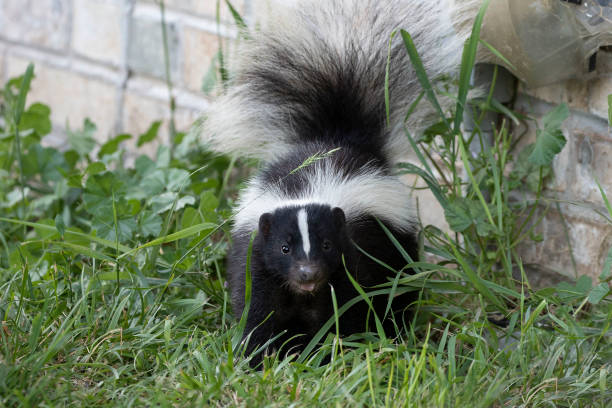You should call for prompt skunk removal if you know, or suspect, that they are on your property. This is especially true if you have one or more pet dogs, as misunderstandings between the two species frequently lead to the dog getting sprayed.
There are a couple of reasons why dogs are susceptible to getting sprayed by a skunk. For one thing, many breeds are quite a bit larger than skunks, which are more likely to feel threatened by them as a result. Perhaps a bigger reason is that dogs are curious by nature. When they find a skunk, their instinct is to investigate more closely. The warning signals that skunks give when they are about to spray look like the signals dogs give each other when they are inviting them to sniff. As a result, the dog is often in a position to get a faceful when the skunk finally decides to spray.
If there are skunks in the area, you should know what to do for a dog that does get sprayed. You should also know how to protect your dog from getting sprayed in the first place.
What Do You Do if Your Dog Gets Sprayed?
If your dog gets sprayed by a skunk, you will know it right away by the smell. Your pet will try to get back in the house to escape the experience but do not allow it. Otherwise, the smell will spread all over the house.
Observe your dog for symptoms of distress. Skunk spray can be mildly irritating but usually is not seriously harmful. Nevertheless, if your dog shows symptoms of nausea or vomiting or seems to be in genuine pain, contact a veterinarian as soon as possible.
As you perceive the pungent odour emanating from your dog, you may wonder, how long does skunk smell last? Left untreated, it can persist for up to three weeks. Therefore, you obviously want to clean up your dog as soon as possible, for everyone’s sake.
Most of the home remedies that you may have heard of to remove skunk smell do not work, but there is a solution you can use that is effective and veterinarian-approved for use on dogs. Add a teaspoon of liquid dishwashing soap and one-quarter cup of baking soda to one quart of hydrogen peroxide. Rub this solution all over the dog’s body but do not allow it to get into the eyes. Rinse your dog off, use the canine shampoo of your choice to thoroughly lather it up, then rinse again. Repeat these steps until you can no longer perceive the skunk smell. It may take several repetitions.
How Can You Prevent Your Dog From Getting Sprayed?
Skunks are crepuscular, meaning that they are most active at dawn and after dusk and, to a certain extent, during the hours in between. You may be able to avoid an encounter between your dog and a skunk if you keep your dog inside during these hours. If you have to let your dog out at night, turn on the yard light first to try to scare away skunks and keep your dog on a leash or a chain so it cannot follow a skunk in retreat from a perceived threat. Supervise your dog while outside.
A better means of protection is to discourage skunks from making dens on your property in the first place. One of the best ways to do this is by fencing in your property. Skunks can jump up to three feet, but they are more likely to try to dig under the fence, so bury it up to one foot below the ground.
Avoid providing hiding spots and potential den sites to skunks by keeping your yard clean and sealing off spaces underneath decks, porches, or sheds. Be sure that no wildlife are underneath before sealing it shut. Keeping your yard clean also helps deprive skunks of food sources.
If you find skunks on your property, contact Skedaddle for skunk removal as soon as possible.



